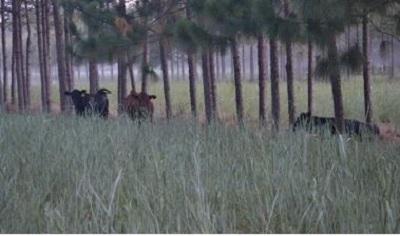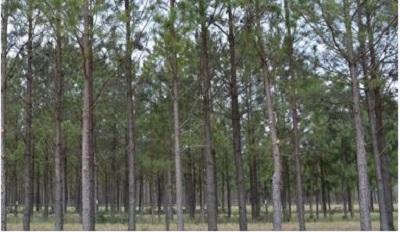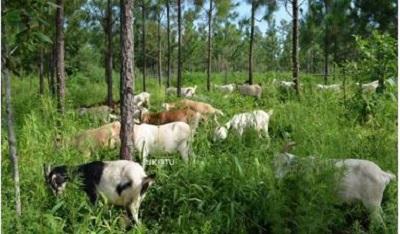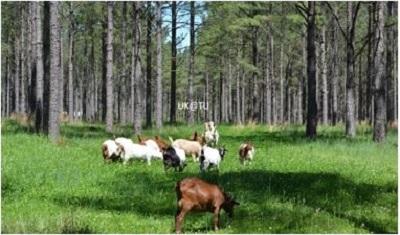What’s a silvopasture and what can it do for me?
Silvopastures are the integration of trees and forages into a working system on a farm. ‘Silva’ is a Latin term, referring to the trees of a region, while pasture is a parcel of land devoted to livestock grazing. Silvopasture is a form of Agroforestry.
Silvopastures should be intentional and can be viewed as an intensive form of on-farm management for timber production, fruits and seeds, forage products, livestock production and husbandry, and wildlife habitat. Well-managed silvopastures (a) employ agronomic principles using a variety of native or introduced forages, (b) provide reasonable nutrient inputs and nitrogen-fixing legumes to foster fertility, and (c) utilize rotational stocking approaches and other top grazing management principles to optimize forage utilization and ecological well-being of soil, water, air, and biological resources on the farm.
View and download the Silvopasture Factsheet.
Why adopt silvopasture on your farm?

- Diversify on-farm income
- Increase biological diversity
- Improve forage quality
- Provide wildlife habitat
- Provide shade for livestock
- Reduce wildfire risk
- Control insects
- Minimize risk of low pulp market prices
- Increase access for salvage after disturbance
- Boost opportunity for recreational activities
- Sequesters carbon in soil and vegetation
What are the benefits of silvopasture?

- Protects water quality
- Reduces soil erosion
- Improves water holding capacity of soil
- Improves nutrient cycling
- Increases tree growth rates
- Improves animal performance
- Reduces forest fuel load
- Increases biological diversity (turkey, quail, songbirds, deer)
- Looks good (aesthetics) and increases property value
- Increases cash flow while trees grow (more diversified and distributed income potential)
- Sustainable (can reduce chemical and mechanical controls of tree stands)
One of the greatest benefits of silvopasture to any farm in the Southeast is reducing heat stress during hot periods. Taking preemptive action to overcome the threats of rising temperature and abnormal precipitation patterns is a smart move and silvopasture management can be a part of that strategy. Even in current conditions, summer pastures with available shade would be a desirable feature. Providing tree shade to livestock can increase the efficiency of feed resources and provide shelter from high winds, snow, and rain.
Are there demonstration sites in the Southeast?
The following are current research and demonstration sites in the Southeast for you to visit, see a silvopasture operation firsthand, and learn more about silvopasture management.

Tuskegee University: Atkins Agroforestry
Research and Demonstration Site*

Plantersville, AL *
*For more information about, or to visit the Alabama sites, email Dr. Uma Karki: ukarki@tuskegee.edu
How can I get more information?
Visit the sites below to learn more about the economic and environmental benefits of silvopasture:
- National Agroforestry Center
- Agroforestry Webinar Library
- Agroforestry Publications
- What is silvopasture? – Working Trees Info, May 2013
- Silvopasture: Establishment & management principles for pine forests in the Southeastern United States
- USDA Silvopasture Case Studies in North Carolina and Virginia
- Shortleaf Pine Initiative
- From pine forest to a silvopasture system
- Sustainable Agroforestry Practices in the Southeastern United States: Handbook for Training Field Extension and Technical Assistance Personnel
State Resources:
- Arkansas: University of Arkansas Cooperative Extension Service
- Alabama: Alabama Cooperative Extension System: Silvopasture, Tuskegee University Agroforestry Program, and Silvopasture: An Opportunity for Additional Income from Your Forestland
- Florida: University of Florida IFAS Extension: Silvopasture
- Kentucky: University of Kentucky Cooperative Extension Service and Agroforestry: Silvopasture
- Louisiana: Louisiana State University AgCenter and Raising Cattle Among Trees
- Mississippi: Mississippi State University Extension: Agroforestry and Silvopasture: Grazing systems can add value to trees
- North Carolina: North Carolina Center for Environmental Farming Systems and Silvopasture: Livestock, forage, and trees
- Tennessee: University of Tennessee Extension
- Texas: Silvopasture in the Western Coastal Plain
- Virginia: Virginia Cooperative Extension: Silvopasture
Can I get assistance to practice silvopasture on my farm?
Yes, visit the USDA Programs website to find out what program might be best for your situation. Contact your local USDA-NRCS field office for guidance and assistance.



